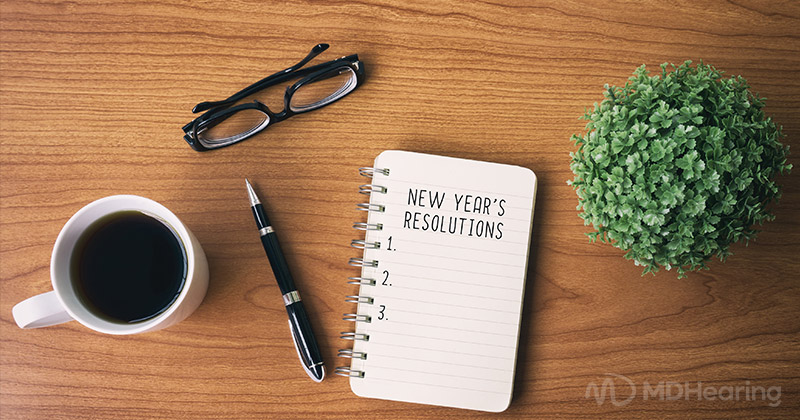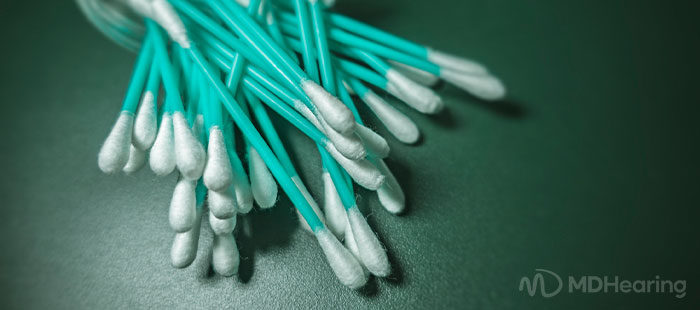Happy New Year! The early days of January and February are a great time to look forward and make plans to enhance your quality of life. New Year’s resolutions are all about making lifestyle changes and improving your health—and this needs to include your hearing.
Here are seven easy-to-keep New Year’s resolutions to help you improve your hearing health in the coming year:
1. Eat a More Balanced Diet
You may already plan to eat healthier in the coming year, but did you know that a healthy diet can benefit your hearing? Increasing your vitamin D intake and eating Omega-3-rich foods like seafood can help protect against hearing loss. Studies also showmagnesiumcan help reduce hearing damage from noise trauma, especially when boosted by vitamins A, C, and E. Magnesium-rich foods include avocados, dark chocolate, bananas, black beans, nuts, whole grains, and leafy greens.
Remember, a balanced diet is the key to good health. Taking too much of one particular vitamin or supplement can actually be harmful, especially if you’re on medication. Be sure to discuss any supplements you take or dietary changes with your doctor or another medical professional.
2. Get to Know Your Medications
Medications are a daily necessity for millions of us, but when it comes to your health, it always pays to educate yourself about what you’re taking. According to the American Speech-Language-Hearing Association(ASHA), more than 200 drugs, ranging from over-the-counter (OTC) medications to chemotherapy drugs, are considered ototoxic. This means they can damage the ear and cause hearing loss, tinnitus(ringing in the ear), and balance disorders.
Ototoxic drugs include aminoglycoside antibiotics and cancer chemotherapy drugs. According to the ASHA, some of these drugs are known to cause permanent hearing damage.
Likewise, quinine and loop diuretics (used to treat kidney and heart conditions) are also considered ototoxic because they can cause temporary hearing damage. And if you’re exposed to loud noise while taking these drugs, it may exacerbate these damaging effects.
According to the American Journal of Medicine, common over-the-counter medications, such as aspirin, acetaminophen, and non-steroidal anti-inflammatory drugs (NSAIDs) may also increase the risk of hearing loss, especially in men under 60. The risk increases if these medications are taken regularly for a long time.
If you’ve been prescribed a new drug or are starting a regular OTC regimen, it’s important to talk to your doctor about potential side effects. If you notice any changes in your hearing while taking these drugs, be sure to inform your doctor immediately.
3. Invest in Ear Protection
It’s always a good idea to wear hearing protection to fireworks shows, concerts, and other events where you’ll be exposed to loud noises. However, you can also be exposed to high-risk noise levels at sporting events, bars, restaurants, and even at home. Everyday devices like lawnmowers, drills, leaf blowers, and other loud household equipment can easily reach over 100 decibels. If you use this type of equipment without ear protection, you could end up with permanent sensorineural hearing lossin as little as 15 minutes.
Quality earplugs can provide an effective and inexpensive way to protect your hearing, so consider keeping a pack with you just in case you need them. Store-bought earplugs typically protect up to 35 decibels, but check the label to determine the level of protection offered. You may also consider buying protective noise-reduction earmuffs—not the cold-weather kind, but the type made to mute loud noises.
4. Use a Better Ear-Cleaning Method
Are you still using Q-tips to swab the wax out of your ears? If so, now’s the time to stop. There’s a good reason a warning is on the package. Q-tips can actually push earwax deeper inside the ear canal, where it can get impacted and cause hearing loss. You can also accidentally damage your eardrum with Q-tips, even if you're experienced using them.
A reputableOTC earwax removal solutionis better for removing wax build-up. It’s also a good idea to have your audiologist or ear, nose, and throat doctor check your ears for wax build-up, which can be easily (and painlessly) removed.
5. Turn Down Your Music
As you get older, you may gradually develop some degree of hearing loss, which can tempt you to crank up your listening devices. However, if you want to preserve your hearing, that’s the worst thing you can do. The more you’re exposed to loud noises, the greater your chances of additional hearing loss. Smartphones, radios, CD players, and other listening devices can easily reach 100 decibels. At that level, hearing damage can occur in just 15 minutes.
Earbuds can especially cause hearing loss if the volume’s too high because the speakers are so close to your eardrums.
The ASHA suggests keeping your music at a volume that’s below 60 percent, or lower than 85 decibels. If a family member or roommate plays their music too loud when you’re around, consider explaining to them why it’s detrimental to their hearing health and yours.
6. Get Your Hearing Tested
Have you been putting off getting your hearing tested? Just like getting a regular physical check-up or an eye exam, having your hearing tested should be part of your ongoing health wellness plan. Once your hearing is lost, it is gone for good. By keeping up with hearing tests, you can best understand your current hearing health and take steps to keep the hearing you still have. Catching these issues early is crucial.
With MDHearing's free online hearing test, you’ll get instant, accurate results that can help you make the right decisions for your hearing health. It only takes five minutes, and you don’t have to sign up for anything. You simply take the test, and if you choose, you can get a free consultation with a licensed hearing professional who can advise you on what to do next.
7. Get Those Hearing Aids You’ve Been Needing
Have you had trouble following conversations or understanding the dialogue on your favorite TV show? If you’ve noticed a decrease in the quality of your hearing or if your loved ones have urged you to get hearing aids, there’s no better time than today.
Thanks to new federal regulations, you can now purchase over-the-counter hearing aidswithout getting a prescription. Many of these hearing aidsare as effective as prescription hearing aids and can improve the quality of your hearing—and your life.
OTC hearing aidsare designed for patients with mild to moderate hearing loss. They amplify and clarify specific sound frequencies, enabling users to hear and communicate better. Although they’re high-tech medical devices, they’re user-friendly, so you don’t have to visit an audiologist to fit or adjust them.
Hearing clinics can charge an average of $4,600 for a pair of hearing aids, which may not include the fees for tests and exams. But at MDHearing, you can purchase OTC hearing aidsfor as little as $297 a pair, including a risk-free, 45-day trial period and free lifetime support from
Hearing loss can cause impaired communication and emotional isolation. It can even lead to balance issues and eventual cognitive decline. By recognizing that you need help and investing in the tools you need to stay healthy, you can combat these risks and improve the quality of your hearing and your overall health. Good hearing will add to your well-being for the new year—and the rest of your life.
Want to test your hearing from home, for free?
TAKE ONLINE HEARING TEST
Want to learn more about MDHearing’s high-quality hearing aids?
COMPARE OTC HEARING AIDS

